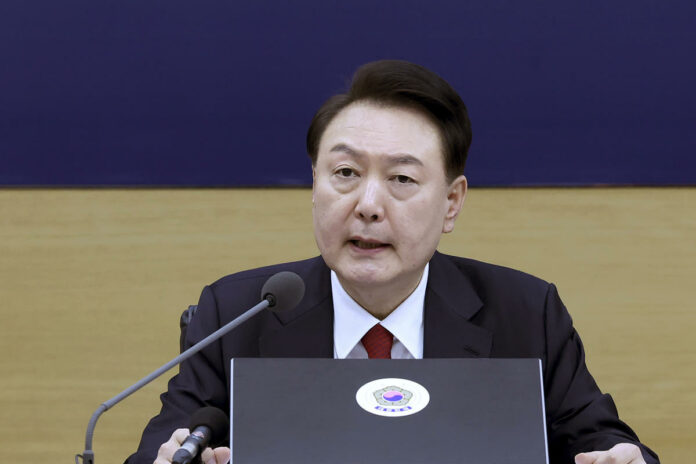SEOUL, South Korea (AP) — South Korea’s president vowed Wednesday not to tolerate the prolonged walkouts by thousands of junior doctors, calling them “an illegal collective action” that threatens public health and shakes the country’s governing systems.
President Yoon Suk Yeol’s government was in the process of suspending the licenses of about 9,000 medical interns and residents over their joint walkouts that have impacted hospitals’ capacity to provide care.
The doctors-in-training have been on strike for more than two weeks to protest a government push to admit thousands more new students to medical schools in coming years. Officials say the enrollment plan is essential to bracing for the country’s rapidly aging population, but doctors say such an abrupt, steep increase in the number of students would eventually result in undermining the overall medical service.
“The collective action by the doctors is an act that betrays their responsibilities and shakes the basis of the liberalism and constitutionalism,” Yoon said in televised remarks at the start of a Cabinet meeting. “An illegal action that infringes upon the people’s right to life will be never be tolerated.”
Yoon’s government had repeatedly urged the striking doctors to return to work or face indictments and minimum three-month license suspensions. But most of the strikers missed a government-set Feb. 29 deadline for their return.
By South Korea’s medical law, doctors who defy orders to restart work can be punished by up to three years in prison or a 30-million-won (roughly $22,500) fine, as well as a up to one year’s suspension of their medical licenses. Those who receive prison sentences can be deprived of their licenses.
Starting from Monday, the Health Ministry began the administrative steps to suspend the strikers’ licenses: dispatching officials to hospitals to formally confirm their absences and sending notices to the strikers about their planned suspensions. The ministry was required to give them opportunities to respond before their suspensions take effect.
Observers say the ministry will likely end up suspending strike leaders, not the whole group of the 9,000 doctors who walked off the job — a daunting administrative task that would likely take weeks or longer.
Vice Health Minister Park Min-soo told reporters Tuesday that the government plans to file complaints against strike leaders to get them to face police investigations as well. But he said officials haven’t determined when they would do so and against whom.
The striking residents and interns represent only about 6.5% of the country’s 140,000 doctors. But in some major hospitals, they account for about 30%-40% of the total doctors and had played the role of assisting senior doctors during surgeries and dealing with inpatients while training. Their walkouts have subsequently caused hundreds of canceled surgeries and other treatments at their hospitals and burdened South Korea’s medical service.
The public is largely opposed to the doctors’ strikes, and surveys show Yoon’s approval ratings rising over his push for the medical school enrollment plan. One poll showed that a majority of South Koreans backed the enrollment plan.
Heath officials have said the country’s handling of emergency and critical patients largely remains stable, with public hospitals extending working hours and military hospitals opening emergency rooms. But if senior doctors joined the walkouts, South Korea’s medical service would suffer a major blow.
The Korean Medical Association, which represents doctors in South Korea, has expressed its support for the striking junior doctors, but hasn’t decided whether to take part in the walkouts.
Police were investigating allegations that five senior KMA officials incited and abetted the junior doctors’ walkouts, and said they summoned one of them Wednesday.


